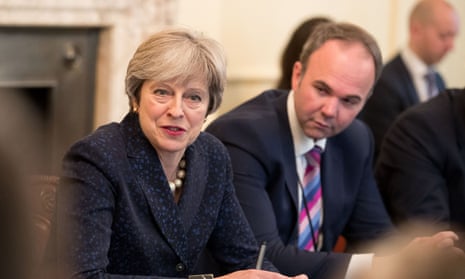As part of the first inside account of one of the most turbulent periods in British politics, Gavin Barwell documents what he calls one of the “worst days” in his two years as Theresa May’s most senior adviser, 4 December 2017. A meeting between May and Jean-Claude Juncker is supposed to solve the problem of the UK/Ireland border and allow the next phase of the Brexit talks to begin.
It ends in failure. After the EU proposes a change to the draft text on Northern Ireland, the DUP leader Arlene Foster sees red and spooked Tory MPs warn that proceeding will jeopardise the confidence-and-supply agreement keeping them in power. May returns empty-handed.
“We were now in a deep hole,” Barwell admits. While a text is later cobbled together, any relief is short-lived. The episode proves fundamental to May’s ultimate inability to secure parliamentary support for her plans.
How the whole saga ended is well known. After repeated attempts to pass a Brexit deal that appalled Tory Brexiters for being too soft while upsetting remain campaigners for being too hard, May’s party turned on her and Boris Johnson ended up as prime minister.
He resolved the issue of the backstop by agreeing to special arrangements for Northern Ireland – the consequences of which are still being grappled with today – and went on to win a Tory landslide.
Barwell nevertheless paints a sympathetic portrait of the May years. He argues that had she not been dealt an impossible hand, her political epitaph would be much more positive than simply “another Tory prime minister destroyed by Europe”.
Barwell entered parliament in 2010 as the MP for Croydon Central before losing his seat in May’s disastrous 2017 snap election. As he tells it here, within hours of those results being announced he receives a call asking him to become May’s chief of staff – replacing the divisive aides Nick Timothy and Fiona Hill – and help her rebuild ties with her party.
He accepts – but is aware of the limits of his role from the get-go: “Most chiefs of staff enter 10 Downing Street at a moment of triumph for their boss, who has either just won a general election or the leadership of the governing party. I was entering at a moment of crisis.” His role was, in his own words, to keep May in 10 Downing Street. While he succeeds in helping to secure May’s position in the days that follow, Barwell constantly battles the sense that both he and May are on borrowed time.
After May’s 2017 conference speech – designed to be a reset moment – descends into chaos with coughing fit and a protester storming the stage and as the clock counts down to the deadline for agreeing a deal, Barwell shows May’s government becoming more chaotic, and politics more vicious. The fact that the chapters are organised by topic rather than chronologically means the timeline can be confusing but the themes are clear – a dysfunctional parliament, self-serving colleagues and polarised politics.
Barwell refrains from too many direct attacks on politicians (he doesn’t rule out a return to Downing Street one day) but there’s enough to get a sense of his true feelings.
He regularly accuses the leading leave campaigners of not being honest about the trade-offs of Brexit. Johnson is a politician who exhibits a “refusal to grapple with the policy detail”. Barwell makes a point of saying he believes recent reports that Johnson said “let the bodies pile up in their thousands” during a debate about whether to initiate another lockdown: “This is exactly the kind of thing he would say if he was exasperated by the advice he was being given.” Dominic Raab is depicted as an opportunist who took on the role of Brexit secretary with little intention of seeing it through.
Remain politicians receive some criticism too. Philip Hammond is depicted as a decent chancellor, but one who could be tone-deaf: “I remember being completely flabbergasted when, during a discussion about tackling the burning injustices Theresa had referred to in her first speech as prime minister, he told me there were no burning injustices in Britain today.”
Given the Brexit debates are all very familiar, the most striking aspect of the book is Barwell’s continuing admiration for May. While this loyalty is laudable, his reluctance to criticise his old boss makes him a less than ideal narrator. On the Windrush scandal, Barwell says the individuals concerned were “inadvertently” caught up in May’s Home Office policies and she was “mortified” on learning that they had been. Regarding her instruction to George Osborne that he should “go away and get to know the Conservative party better” when she sacked him as chancellor, Barwell asserts that not for “one minute” had “Theresa meant to humiliate George”. As for May’s poor record at keeping ministers in post, he puts it down to a combination of Brexit and those ministers making mistakes.
But surely, some of the fault for these problems could lie with May? Could a stronger boss have inspired better behaviour? If May was really so across the detail, how did Windrush go unnoticed?
There’s a revealing line on May’s post-election reshuffle in which Barwell recalls the conversations she had with ministers who are staying put. The then communities secretary, Sajid Javid, uses the opportunity to ask “for the prime minister’s personal mobile number”. She agrees. While Barwell heralds it a sign that their relationship had improved, most would ask why on earth it had taken so long to get to that point. Barwell accepts that May’s term as prime minister will ultimately be judged on her failure to deliver Brexit, but believes her decision to prioritise the union could yet be vindicated as the repercussions of Johnson’s deal are felt in Scotland and Northern Ireland. If he is right, then the book’s more frustrating passages may one day be seen in a different light, too.
